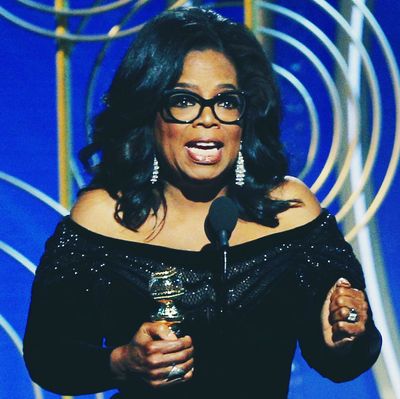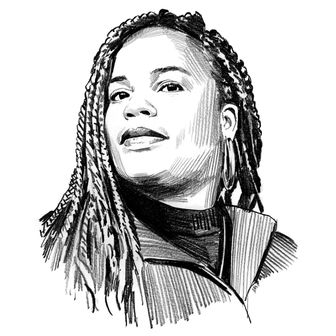
Was anyone surprised that Oprah’s Golden Globes speech — accepting the Cecil B. DeMille Lifetime Achievement Award, as the first black woman to do so — was spectacular? Honestly, if she’d just stood there while her highlight reel played, the clip of her saying “All my life I had to fight” in The Color Purple would probably have been enough to inspire a national TV audience to find 100 different ways to change their lives this week.
Basically, Oprah doesn’t need to do a lot to move a crowd and get a standing ovation. But her acceptance speech tonight accomplished more than that: She finally put black women at the front of this protest.
After discussing the #MeToo movement as a whole, acknowledging “all the women who have felt strong enough and empowered enough to speak up and share their personal stories,” Oprah shared the rarely discussed story of a woman who would never live to see justice, Recy Taylor. She said:
And there’s someone else, Recy Taylor, a name I know and I think you should know, too. In 1944, Recy Taylor was a young wife and mother walking home from a church service she’d attended in Abbeville, Alabama, when she was abducted by six armed white men, raped, and left blindfolded by the side of the road coming home from church. They threatened to kill her if she ever told anyone, but her story was reported to the NAACP, where a young worker by the name of Rosa Parks became the lead investigator on her case and together they sought justice. But justice wasn’t an option in the era of Jim Crow. The men who tried to destroy her were never prosecuted. Recy Taylor died ten days ago, just shy of her 98th birthday. She lived as we all have lived, too many years in a culture broken by brutally powerful men.”
Here’s the thing about her speech: There’s some room for debate about how much faith to place in the kind of activism that happens at an awards ceremony. And even among the sea of black dresses and the activists on the arms of celebrities, the politics at play tonight felt slight. The accumulation of moments like the E! cameras cutting away from #MeToo founder Tarana Burke in favor of Dakota Johnson’s dress (and like the speeches that only barely addressed the Weinstein-sized elephant in the room) amounted to a night that felt somewhat disappointing.
But thank god for Oprah, who brought the fire, with that thunderous voice, with the right balance of raw emotion and composed rhetoric. She delivered the satisfying, emotional, standing-ovation-worthy moment viewers needed from a post-Weinstein Golden Globes ceremony. By focusing on the story of Recy Taylor and Rosa Parks, she reminded everyone that black women were part, have always been part, of this protest, too. And then she did what everyone really needed her to do: She told all of the people in the room to listen to women, to listen to black women.
Of course, the show had to drag on for another 30 minutes or so after that heart-stopping speech — and the awards category that immediately followed was, as Natalie Portman pointed out, completely made up of male nominees. But Oprah had already given the night its crescendo when she bluntly said what others politely did not: “Their time is up.” She left a room of people totally shook, and left some men quaking. “For too long, women have not been heard or believed if they dare speak the truth to the power of those men,” Oprah told us all. “But their time is up. Their time is up!”


